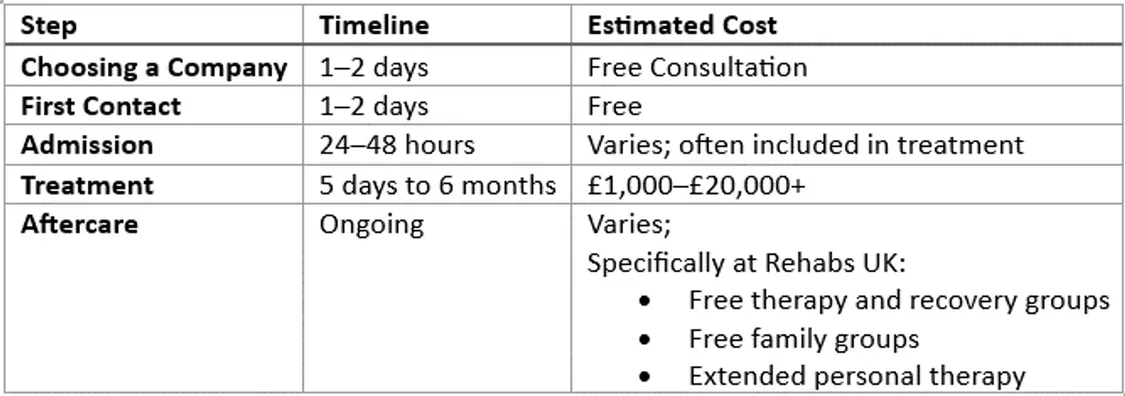10 Feb 2025
Understanding the process and timeline of using an addiction referral company can provide clarity and confidence as you begin your journey to recovery. This article outlines each step, from choosing a referral company to aftercare, and highlights how these services can simplify the path to treatment.
It’s important to note that while recovery services are available on the NHS, your choice between NHS and private care will influence the options available to you. Referral companies, at times in collaboration with your doctors, can help you navigate these decisions based on your needs and circumstances. For more about our Addiction rehabilitation innovation: Predictions for 2025 visit our blog. It's crucial to understand that some referral companies could operate unethically. To make the best decision for an individual's recovery, it's important to recognise the warning signs of those companies that may not have your loved one’s best interest at heart.
In the UK, there are two main routes into rehab. Scott Ardley, Senior Treatment advisor, explains the processes below:
Funded Rehab via Community Services
“For individuals unable to afford private rehab, the first step is to visit their GP, who can refer them to the local drug and alcohol service. Every area has services like CGL, Turning Point, We Are With You, and others.”
“Through these services, individuals can access support, create a pathway to treatment, and begin the process of applying for funding, however, this is extremely limited and can depend on where you live as well as your addiction. The process can take time, typically 6 months to 2 years and does not guarantee rehab or a treatment plan. Residential rehab can be particularly difficult to access via these means."
“The funded route usually requires full engagement with other recovery support groups and community services before treatment of any kind becomes an option. This can particularly challenging for someone who is in active addiction to ensure they attend appointments and follow the process required. Hospitals may also refer individuals to these services if they are admitted with addiction-related issues.”
Self-Funded Rehab
The alternative route is self-funding, which is significantly quicker and allows the individual to be actively involved in finding the right treatment path for their needs—a crucial first step in their recovery journey. As long as they are over 18, individuals can admit themselves without a referral. Often, families are involved in this process for support and funding.
“This option is straightforward, and admission can often happen the next day—or even the same day—depending on the clinic’s availability. However, affordability can be a barrier for some, but there are often cost-effective options available that you may not be aware of. By contacting Rehabs UK you will be given a range of treatment plans and providers ensuring that you have a full range of choice, which may not be the case if you contact a facility directly.
Most people entering treatment for alcohol dependency in England self-refer. In 2021–22, only 23% of referrals were from health services.
There are various different options available when looking for treatment services they can range from residential rehab, non-12 step approaches, recovery retreats, home detox and interventions. Speak with the Rehabs UK team to find out which is the best option for your needs.
How to Get Someone into Rehab
- Research Treatment Options – Look for suitable rehab centres based on their needs; this can be done by contacting a treatment triage service such as Rehabs UK (NHS, private, charity-funded).
- Talk to Them – Approach the conversation with care, emphasising support, not judgment.
- Seek Professional Advice – Contact a GP, addiction helplines, or Rehabs UK who can link you with intervention specialists.
- Consider an Intervention – Organise a structured discussion with family, friends, or a professional.
- Check Funding Options – NHS referrals, private payment, or charity-funded programs.
- Help with Logistics – Assist with admission, transport, and necessary paperwork.
Step 1: Choosing a Referral Company
Selecting the right referral company is a critical first step. Consider the following factors:
- Reputation: Look for companies with positive reviews and testimonials. Their website will often include images of “real people” rather than models and they may offer a variety of free resources such as aftercare and groups
- Transparency: Avoid organisations that engage in unethical practices. This might involve being bombarded with phone calls from people or facilities you don't know and pressured into making a decision without genuine concern for your well-being. You should also be provided with a range of options and relevant information so you can make a fully informed decision.
- Expertise: Ensure the company’s team includes addiction specialists.
A reputable referral company will provide clear information about treatment options, costs, and timelines, helping you avoid scams and focus on recovery.
Registered BACP Therapist, Jakana Rita states:
“Working with Rehabs UK has been an absolute pleasure. Integrity is a central pillar of the company where staff work tirelessly to provide a service which is of maximum benefit to the client. Working with the team has always been easy and everyone has the best intentions for everyone involved. Scott Ardley, Senior Treatment advisor works closely with the client base and provides a service for both therapists working for the company and clients seeking help.”
Outlined below are terms which have been broken down to understand exactly how referral companies work:
Addiction Referral Centre
- Purpose – Helps triage individuals to find suitable treatment for addiction.
- Services – Free Assessments, referral to detox, rehab or other appropriate treatments such as therapy.
- Availability – NHS, private, and charity-run centres available across the UK.
- Examples – Rehabs UK, We Are With You, Frank.
- Contact Methods – Helplines, online chat, in-person assessments.
To gain a deeper understanding of how addiction referral services and rehabs operate, listen to our Altered Attitudes podcast episode: 'The Truth Behind Rehab Referral Fees and Referral Companies.'
Addiction Referral Agents
- Who They Are – Professionals who assess and refer individuals to appropriate treatment.
- Types – Independent consultants, NHS specialists, charity workers.
- Services Provided – Initial assessment, referral to detox/rehab, funding guidance.
- How to Access – Through GP, helplines, and private services.
- Examples – Rehabs UK, NHS drug and alcohol services.
Step 2: First Contact and Interview
Your initial contact with the referral company often involves a phone or video consultation. During this interview, specialists will:
- Discuss your addiction history, medical background, and personal circumstances.
- Identify the type of treatment best suited to your needs.
- Provide a personalised treatment plan, considering factors such as location, budget, treatment philosophy (12 step or non 12 step) and any co-occurring conditions.
This step typically takes 1–2 days, depending on the complexity of your case.
Lester Morse, Director of Rehabs UK states: “If you call a rehab directly — depending on which one you call — you may be talking to someone whose only interest is to help you, and isn't overly focused on the sale of a bed.
The truth more often than not is you will probably be speaking to a salesperson on bonus, a model that is understandable as services need clients to avoid closure. I am not saying salespeople are wrong, but they probably aren’t going to tell you about all the different options and instead focus on making the biggest sale!"
Step 3: Admission
Once a treatment plan is agreed upon, the referral company coordinates your admission. This includes:
- Confirming availability at your chosen facility.
- Assisting with necessary documentation or medical clearances.
- Helping to arrange transportation if required.
Admissions can often be arranged within 24–48 hours for urgent cases, though this timeline may vary.
Step 4: Treatment
Treatment programmes vary based on individual needs but generally fall into the following categories:
- Inpatient Rehab: Provides 24/7 care in a controlled environment, typically lasting 28–90 days.
- Outpatient Programmes: Allow patients to continue living at home while engaging in outpatient treatment, often over 3–6 months.
- Detoxification: A supervised process to manage withdrawal symptoms, lasting 7–10 days. At Rehabs UK we can offer both home detox or within an inpatient setting.
Your referral company will remain in contact to ensure your treatment aligns with the agreed plan.
Step 5: Aftercare
Recovery doesn’t end when treatment does. Aftercare plans may include:
- Ongoing counselling or therapy.
- Support groups such as Alcoholics Anonymous (AA) or Narcotics Anonymous (NA).
- Online groups and WhatsApp support groups
- Relapse prevention strategies.
Some referral companies such as Rehabs UK provide follow-up support and recovery coaching to help you maintain long-term sobriety.
At Rehabs UK if you or your loved one uses any of our services you will be given access to two online weekly groups as well as a WhatsApp Group for additional guidance free of charge. The first group is called the Recovery Foundation Group which is delivered by our very own expert and director Lester Morse. The second weekly group is our Recovery Support Group which is facilitated by therapist Jakana Rita.
Sue, a former client at Rehabs UK comments: “I have been with Rehabs UK for over 2 years. Initially for a Home Detox, later for Therapy and Rehab. Prior to this I had been an Alcoholic for 26 years.
During this time, I have had many ups and downs. The downs being mainly at the beginning. However, I have received unwavering support during this time. The WhatsApp group has been invaluable for providing information and for connecting with others in recovery right from the beginning. This group can also be used to alert the support team that you are struggling and would appreciate talking to someone individually, or asking to chat to someone else in Recovery on a 1 to 1 basis. It's not all serious though, there is also a lot of banter and jokes. After all, we get better and get to have a happy life. “
Rehabs UK also offers a weekly recovery group within our aftercare programme. This is run by therapist Jakana. This is available to anyone who has used our services.
Sue goes on to say: “The thing I have appreciated most has been the weekly Recovery group which has been vital in my recovery. The group is run by Jakana a highly trained Therapist and the members of the group are either in recovery or making efforts to get into recovery. The group discusses each other's progress, supports each other's trials and tribulations and offers each other tips from their own experience. This group offers kindness, support and a genuine caring attitude towards each other mixed with a lot of laughter. Laughter has definitely been the best medicine for me. I am now nearly 2 years sober, which in itself is a miracle and would never have happened without the support I have received.”
We also offer weekly online talks for the family members who are supporting their loved one as part of the service.
It is important to understand that not all referral companies or rehab facilities offer this type of aftercare, in some cases they do not provide any aftercare at all. Rehabs UK prides itself on our care for clients which is why we make these free services available for as long as needed.
Summary
Here is a brief overview of the key stages:

Alternatives to AA (UK)
- SMART Recovery – Science-based, self-empowering program.
- Celebrate Recovery – Christian-based recovery support.
- LifeRing Secular Recovery – Peer-led, secular support network.
- Cognitive Behavioural Therapy (CBT) – Professional therapy approach.
- Private or Group Therapy – Individual counselling or group therapy sessions.
- Online Support Groups – Various addiction recovery forums and communities.
Get Support Today
If you’re considering addiction treatment, contacting Rehabs UK is an excellent first step. Our team of specialists can discuss your unique circumstances and recommend the best path forward to ensure effective care. Get in touch today to start your journey towards recovery.
